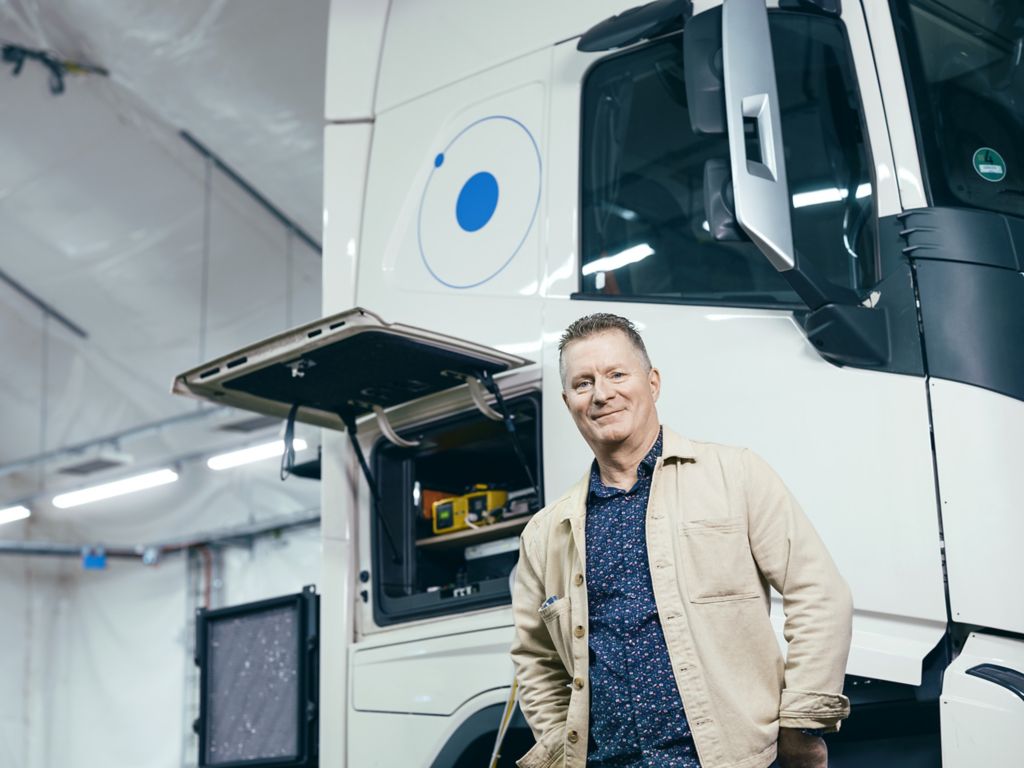New career at 55 – as a hydrogen safety expert


We need to do something. We can't continue to live like we are because we’re destroying the planet. For those of us working in the automotive industry, developing climate neutral alternatives like fuel cell technology is one way we can make a difference
As the need to combat climate change becomes more urgent, it’s not hard to see the appeal of hydrogen fuel cells. The technology offers many of the same benefits of electrification as the battery electric technology– namely zero tailpipe emissions – but with the added advantage of longer ranges and faster refuelling. The Volvo Group has set itself the ambitious target of producing fuel cell-powered vehicles by the second half of the decade, and is already working diligently today to make this happen. However, for the technology to be successful, it needs to be safe. This is Per Hellberg’s role as the Volvo Group’s Hydrogen Safety Expert.
“Hydrogen is a new fuel, so we need to understand its characteristics and know how to handle the risks,” says Per. “We need to be confident that if we release a fuel cell vehicle on the market, that we have covered all aspects of safety.”
The unique safety risks associated with hydrogen are its wide span of flammability and its high concentration of energy mass, which is three times greater than diesel. Since it needs to be compressed to be stored on the vehicle, it requires 700 bar of pressure (compared to 200 bar for a standard gas tank), which can also be an added safety risk if not properly handled.
Per’s main workplace is a large, white tent erected in the carpark outside of the Volvo Group’s CampX in Gothenburg and inside is the Volvo Group’s first ever prototype of a fuel cell heavy-duty truck. Among Per’s responsibilities was setting the parameters and specifications for the tent, to ensure it had right conditions and ventilation for working with hydrogen. As the technology is developed and tested, he also oversees the development of the necessary safety features.
“The systems we are developing are autonomous when it comes to deciding if actions are needed due to some unexpected situation,” he explains. “The objective is to always protect the user, the surroundings and the vehicle itself.”
Being the Volvo Group’s designated expert on hydrogen safety is a wide departure from Per’s previous roles within the company. Having started as mechanic in the engine lab, he has worked in various positions within engineering and later management over the past 25 years. In his last position, he worked with the Volvo Group’s R&D investment programme, where he first saw the growth potential of hydrogen fuel cell technology.
“I could see from the level of investment going into the area that the technology was going to develop quickly,” he says. “Being the technology freak that I am, I decided to use my time off during the Covid-19 pandemic to increase my competences around hydrogen. I was excited by the prospect of working in a new area so early in its development.”
Per’s self-motivated efforts included studying at university by distance as well as a series of internal courses available within the Volvo Group. The areas he covered included the ecosystem around hydrogen to better understand what is needed in terms infrastructure, the fuel cells themselves to understand how they work, and how to safely handle the hydrogen gas itself. When he returned to full-time work, his newly acquired knowledge made him the perfect candidate for the role of Hydrogen Safety Expert.
“In the last ten years in particular, the Volvo Group has opened up more and more opportunities for employees to build up their competences,” he says. “We have access to some very good tools and resources, and various training programmes available to us. We’re encouraged to developed, because that’s how we stay competitive. If we stop developing, the company stops developing.”
Name: Per Hellberg
Title: Hydrogen Safety Expert
Age: 57
Background: Started at Volvo Cars and moved to the Volvo Group in 1994, original as a mechanic in the engine lab. Later became head of the lab, before moving into various engineering positions, and later management positions. Most recent role before becoming Hydrogen Safety Expert was with the Volvo Group’s R&D investment programme.
Years at Volvo Group: 27
What drives you: “Being a technology freak, I love having the opportunity to work with new technology at such an early stage of its development. When I’m asked what I work with, I say that ‘I’m working with the future’ because what we are working with will change the whole automotive industry.”
Learn more about Engineering and Technology jobs at Volvo Group here